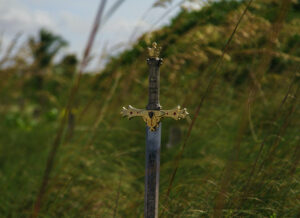There are a lot of quotes in aikido and in martial arts in general. They get tossed around like candy and often there is little consideration of them. I think that some of these quotes need to die. There are various reasons for this. Some are mistranslations, some are just silly, and some wildly misunderstood. Regardless they keep cropping up. This one concerns the lot of a gardener in war.
This post’s quote that needs to die is:
‘It is better to be a warrior in a garden, than a gardener in war.’
I’m sure you’ve heard that one before.
Origins
Apparently, this quote comes from an old Chinese martial arts story (though I’ve seen it attributed as Japanese) in which a student asks why he must learn the sword in order to be calm and suggests it would be better to tend plants to achieve this. The master replies that ‘Tending the garden is a relaxing pastime, but it does not prepare one for the inevitable battles of life. It is easy to be calm in a serene setting. To be calm and serene when under attack is much more difficult; therefore, I tell you that it is far better to be a warrior in a garden rather than a gardener at war.’

I have, on rare occasion, seen this stated slightly differently. A very important change, that alters the entire meaning of the quote in numerous ways, is the use of ‘tending a garden’ instead of ’in a garden’. It is far rarer to see this though. The most prevalent form is ‘in a garden’.
This quote is a favourite of many martial artists and the reason seems to be along the lines of, WARRIOR! I AM A WARRIOR! RAAAH, or something like that.
The problem with this quote is that it doesn’t actually make any sense. It ignores the reality of the situations to score a point against the unquestioning. To illustrate this I’m going to work backwards with this quote, I’m going to start with the second phrase.
A Gardener in War
A gardener in war. The implication here is that a gardener in a war will inevitably be killed because they have no martial skills, they don’t know how to attack or defend and will get slaughtered by the warriors. This is a reasonable assumption provided you accept the basic premise of the quote, which is that the gardener has no combat skills.
If that is true then yes, the gardener will likely die very quickly, while the warrior goes on to live his glorious life (having killed all these gardeners). This is the reason for starting with the second phrase and not the first. The second phrase is making the lack of skills extremely clear. In order to be consistent, and make sense, that lack of skills must also apply to the warrior.
A Warrior in a Garden
If, as the quote implies, the gardener has no skill in war, then the warrior has no skill in the garden. They do not know how to tend plants, how to make them grow and keep them alive. This is a major problem for the warrior. If he can’t tend the plants he can’t grow his food and now he dies. Incidentally, starvation isn’t a nice way to go. It’s a pretty nasty one. It’s long, lingering, and involves a truck load of suffering.
While the gardener has perished a relatively swift death, the warriors route to the grave is much more protracted. On a personal level I am not a big fan of pain or suffering and would therefore chose the route of the gardener. Sure it would be terrifying, but it seems like a better way to go to me.
The Story
If you consider the story that is supposed to surround this quote then it makes even less sense. Let’s deal with the idea that gardening doesn’t prepare you for the inevitable struggles of life. Anybody, who has ever gardened for more than a day, will tell you the exact opposite is true. Gardens are hard work, growing food is even harder.
Let’s run with the food angle for a while. If this is what you’re doing there is the pressure of knowing that if you fail you starve. This awareness exists for you every single day, and goes on for months or years. Likewise the warrior has a similar pressure, knowing that each battle could be their last.
That’s not the only pressure for the gardener though. Plants require constant attention. Everyday they need checked for encroaching pests (slugs love to eat lettuce for instance), in summer they need watered (tomatoes can burst if not watered correctly), in winter they need shelter (frost will kill a lot of plants). Seeds must be planted at just the right time and given even more care as they are very fragile at first. Soil needs to be fertilised and so on.
While the warrior battles other people, and knows he can win, the gardener battles the elements and knows that he will ultimately lose. War’s end, weather goes on. Warrior’s go home and rest, gardeners get up and keep fighting.

Gardening Is A Better Reflection
It would not be that difficult to argue the case that the pressures of gardening are more akin to a person’s daily life. During the long constant struggle of each day little things crop up to divert and deflect us from our goals. What we don’t accomplish today as a result of them must be picked up and completed tomorrow. There is always one more thing we need to complete. The list of tasks never ends.
The story asserts that it is easier to be calm in a serene setting and that a garden is such a place. I would agree whole-heartedly. It is easier to be calm in a garden, but only if it is a mature garden that requires little effort, or failing that someone else’s.
It also suggests that it’s hard to be calm when under attack. Again, I agree completely; however, it’s entirely possible to train yourself to be just that.
A Counterpoint
Of course these arguments are all countered by pointing out that it’s not necessarily about food. The quote could just as easily be about growing flowers. Quite true, but irrelevant. The pressures of growing a flower are the same as growing a tomato. The only difference is you may not starve if you’re only concerned with growing flowers. I would mention though that I have occasionally seen this quoted as ‘farmer’ rather than ‘gardener’.
My problem with that though is that we’re now straying into a realm where things are not binary. The quote is suggesting there are two professions, gardener and warrior. The story indicates that gardening is a past-time, so I’d be inclined to suggest that the farming/food is not what is meant (but let’s not forget about mis-translations and the like).
Unfortunately this means we’re now comparing a profession to a hobby. If this is the case, which the story, but not the quote, suggests, then the warrior in fact knows how to garden. If that is the assertion then why is the reverse not also true. Why can the gardener not be proficient at waging war?
The warrior may be better at war than gardening and vice versa, but that doesn’t mean they can’t do what the other does. While an intriguing line of thought we’re not going to follow that thread here. It takes us down the road of levels of skill and competence and would be quite lengthy on its own. I’ll trust you to follow it in your thoughts and find some interesting inferences.
All The Issues
This quote (and/or its accompanying story) then:
- Can imply that the warrior suffers a horribly slow death.
- Ignores the possibility that gardening is actually more stressful.
- Ignores the idea that the struggles of gardening are more analogous to daily life than being at war.
- Suggests the warrior can be a gardener, but that a gardener cannot be a warrior.
- Compares a hobby to a profession.
I’m sure there is more that I could bring up to criticise this quote but I think that’s enough.
This quote, needs to die.
If you can afford it, and would like to help out,
consider donating some brain fuel!
Also, if you enjoyed this post you can find further insights in this book.